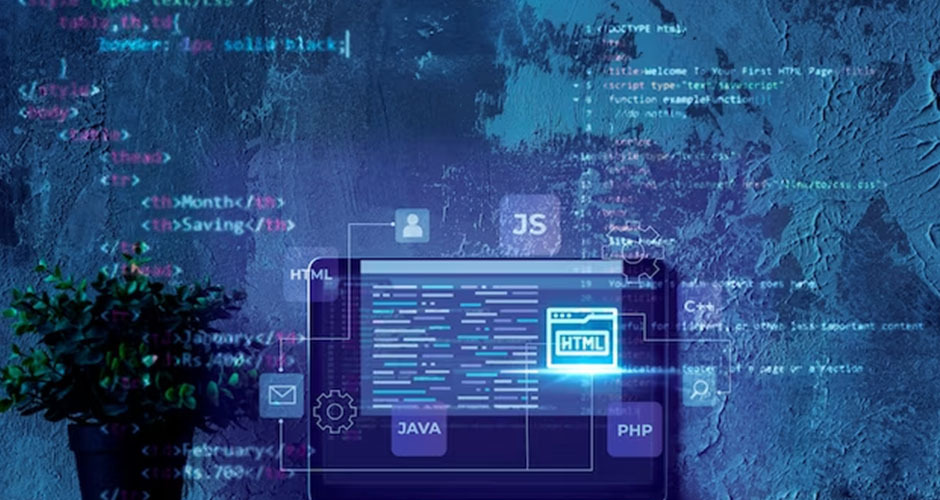
Development, in the context of the digital world, refers to the process of creating and enhancing various aspects of web-based platforms and applications. Web development, which includes website development, plays a pivotal role in shaping the online presence of businesses and individuals alike. A web development company is an entity that specializes in providing comprehensive services to design, build, and optimize websites for clients.
When we talk about web development, we’re usually referring to the coding and markup of websites. On the other hand, website development covers a broader range of tasks, like scripting for the client-side and server-side, configuring security for servers and networks, developing eCommerce features, and building content management systems (CMS).

Website development is a multifaceted discipline that involves a series of technical and creative processes. It encompasses front-end development, which focuses on the visual elements and user interface, and back-end development, which deals with the functionality and data handling of websites. A skilled web development company seamlessly merges both front-end and back-end aspects to deliver a fully functional and visually appealing website.
In the dynamic digital landscape, the role of a web design company is equally crucial. Web design pertains to the aesthetic and user-centric aspects of website development. A web design company ensures that websites are visually engaging, easy to navigate, and optimized for a seamless user experience. Combining their expertise in web development and design, these companies create websites that not only showcase the brand identity but also enhance user engagement and drive business growth.

Web development is like the behind-the-scenes wizardry that powers our online experiences. It’s about crafting websites that don’t just look good, but work seamlessly too. From designing layouts to ensuring buttons and forms function smoothly, web development services are the art of making the digital world interactive and user-friendly. It’s a dynamic field that keeps evolving with technology, driving everything we do online, from shopping to streaming videos.
The significance of the Internet remains unwavering. In fact, it has evolved into a vital gateway and primary avenue for research, connection, education, and entertainment on a global scale. With a staggering count of 4.66 billion Internet users worldwide as of 2021 – encompassing over half of the planet’s population – the online realm’s influence is undeniable. The swiftly escalating number of Internet users naturally fuels the rapid expansion of the web development industry. Anticipated to continue thriving until 2030, the demand for web developers is projected to surge by 13%, a growth rate that outpaces many other technological professions.
Whether you’re aiming to hire a web developer or embark on a journey to become one, it’s essential to grasp the various branches of web development that developers can specialize in. These different facets of web development in Pakistan correspond to the diverse realms within the profession where web developers excel. While there might be some overlap among these distinctions, it’s common for web developers to skillfully navigate multiple types of web development simultaneously.
Now that we’ve defined web development, let’s review some web development basics
Websites, as you may know, consist of files that are securely stored on servers. These servers, essentially powerful computers, play a vital role as hosts for these websites. Connected through the vast network of the Internet, these servers make it possible for your website to be accessible to users everywhere. When it comes to accessing websites, that’s where browsers like Google Chrome or Internet Explorer come in. These software applications are responsible for loading websites, utilizing your Internet connection to fetch the desired content. Meanwhile, the devices used to browse and interact with these websites are referred to as ‘clients.’ This entire ecosystem, which involves connecting servers, browsers, and clients, is where the expertise of a skilled website development company comes into play, ensuring a seamless and user-friendly digital experience.
Accessing a website requires knowledge of its unique Internet Protocol (IP) address – a series of numbers assigned to distinguish each device amid the vast Internet landscape. To discover a website’s IP address, resources like Site 24×7 or tools like Command Prompt on Windows and Network Utility > Traceroute on MacBooks prove useful. On the other hand, to unveil your device’s IP address, a simple search query like “what’s my IP address” suffices. However, while direct access via IP is possible, most users favor the convenience of domain names or the assistance of search engines for swift navigation.
This intricate online experience is where specialized web development services come into the picture, ensuring seamless interactions and user-friendly journeys. With their expertise, navigating the intricate online ecosystem becomes efficient and engaging, enabling businesses to establish a strong online presence and capture audience attention effectively.
Hypertext transfer protocol (HTTP) creates a connection between you and your website request to the remote server that contains all the website data.it is a guideline that defines how messages should be sent over the internet. It’s like a rulebook (a protocol) that outlines how messages move around the Internet. This helps you effortlessly move between pages and websites.
Whenever you enter a website in your browser or look up something using a search engine, HTTP sets up a system where your device (client) and the server understand each other, allowing seamless communication as they exchange requests and responses across the Internet. It essentially acts as a translator mediating between you and the Internet. It interprets your website request, deciphers the code received from the server, and presents it to you as a fully functional website.
Coding involves crafting code for servers and applications using programming languages, often referred to as ‘languages’ due to their vocabulary and grammatical rules that allow effective communication with computers. These languages also encompass unique commands, shortcuts, and symbols that are comprehensible solely to devices and software.
Every software is created using at least one coding language, although the choice of languages varies depending on the platform, operating system, and preferred style.
All languages can be categorized into either front-end or back-end.

Front-end (also known as client-side) refers to the visible and interactive side of a website or software that Internet users engage with. Front-end coding languages enable websites to operate smoothly without constant back-and-forth communication with the Internet, as they facilitate the transfer of website data from a server to a browser.
Using front-end code, users can engage with websites by playing videos, expanding or minimizing images, highlighting text, and performing various other actions. Front-end coding tasks are handled by web developers engaged in client-side development.
Back-end (also referred to as server-side) refers to the aspect that remains hidden from view while you’re using the Internet. It forms the digital framework, and for those not versed in development, it appears as an arrangement of numbers, letters, and symbols.
There exist a greater number of coding languages for the back-end than for the front-end. That’s due to the fact that browsers, situated on the front-end, solely comprehend HTML, CSS, and JavaScript, while servers, located on the back-end, have the capacity to be configured to comprehend a wide range of languages.
A content management system (CMS) refers to a web application or a set of programs employed for generating and overseeing web content.
Although not obligatory for website construction, utilizing a CMS simplifies the process. It furnishes the foundational elements (such as plugins and add-ons) and empowers you to construct the framework using your own code. CMSs find frequent application in e-commerce and blogging scenarios, yet their utility extends to all kinds of websites.

Constantly, there are individuals with malicious intent seeking vulnerabilities within websites, aiming to expose private information, pilfer data, and disrupt servers. Cybersecurity involves the process of safeguarding data, networks, and computers against these potential threats. The techniques employed by hackers are perpetually changing, just as the security measures adopted to protect against them. Not comprehending how your site might become a target could lead to disastrous consequences.
Hence, having a fundamental grasp of cybersecurity best practices is crucial for ensuring effective website development services. Performing regular security audits is also recommended.
Now, let’s explore the various types of web development that a developer could focus on.
Whether you’re considering hiring a web developer, website development company or pursuing the role yourself, it’s essential to comprehend the various facets of web development that developers can specialize in. These distinctions primarily revolve around the sectors within the profession where web developers operate. Often, these categories interconnect, with developers frequently mastering multiple types of web development.
Crafting the user-facing side of websites, programs, and software, front-end developers shape what users perceive. They design visual elements and layout, enhancing navigation, graphics, and aesthetics. Their role extends to user experience, building interfaces that guide users towards their goals. When seeking web development services from a website development company, front-end expertise is key.
Back-end web developers ensure the seamless functionality behind the scenes. They work on servers, operating systems, APIs, and databases, managing code for security, content, and architecture. Their collaboration with front-end developers ensures a complete user experience. Professional web development services also encompass the intricate back-end work vital for smooth performance.
Bridging both front-end and back-end, full stack developers create websites, applications, or software from start to finish. Their mastery covers the stack of technologies powering diverse functionalities. Seeking web development in Pakistan? A full stack developer course equips experts with skills to optimize performance and navigate various web service components.
Web developers, whether specializing in front-end, back-end, or full-stack, center on creating websites. Website development services, such as custom web design, cater to businesses seeking a strong online presence.

Crafted for mobile devices like smartphones and tablets, mobile developers create apps with distinct operational dynamics, necessitating specialized skills and knowledge of programming languages.
Game developers code for various platforms including consoles, PCs, and mobile devices, sometimes overlapping with mobile development.
Operating beyond traditional computers, embedded developers handle hardware for electronic interfaces, consumer devices, IoT, and real-time systems. With rising demand for interconnected devices, this skill is crucial.
Safeguarding software and websites, security developers work as ethical hackers, identifying vulnerabilities, and building protective systems. For web development services in Pakistan, or a trusted website development company in Pakistan, these diverse skills play a pivotal role.
Web development stands as the creative and technical cornerstone of our digital world. Its fusion of design and coding crafts the interactive landscapes we navigate daily, from seamless user experiences to the intricate architecture that powers websites. As the Internet’s influence continues to expand globally, the demand for skilled web developers and web development services escalates, shaping a dynamic industry poised for remarkable growth. From front-end aesthetics to back-end functionality, web development encapsulates the art and science that drive our online interactions, making it an essential and ever-evolving force in the digital age.
Continuing on this journey of innovation, a leading player in the realm of web development steps onto the stage – Bee Buzz, a visionary web development company in Pakistan. Just as a skilled jeweler crafts intricate pieces, Bee Buzz expertly weaves codes and designs to construct virtual masterpieces. With a commitment to harnessing the brilliance of our digital world, Bee Buzz serves as a dynamic force, where the fusion of creativity and technical expertise creates websites that shine. As the digital landscape expands and evolves, the demand for such adept web development companies surges, and Bee Buzz is at the forefront of driving this transformation. Just as a nation’s jewels symbolize its splendor, Bee Buzz’s work exemplifies the radiance that comes from weaving together design and coding – a testament to a brighter, more connected digital tomorrow.